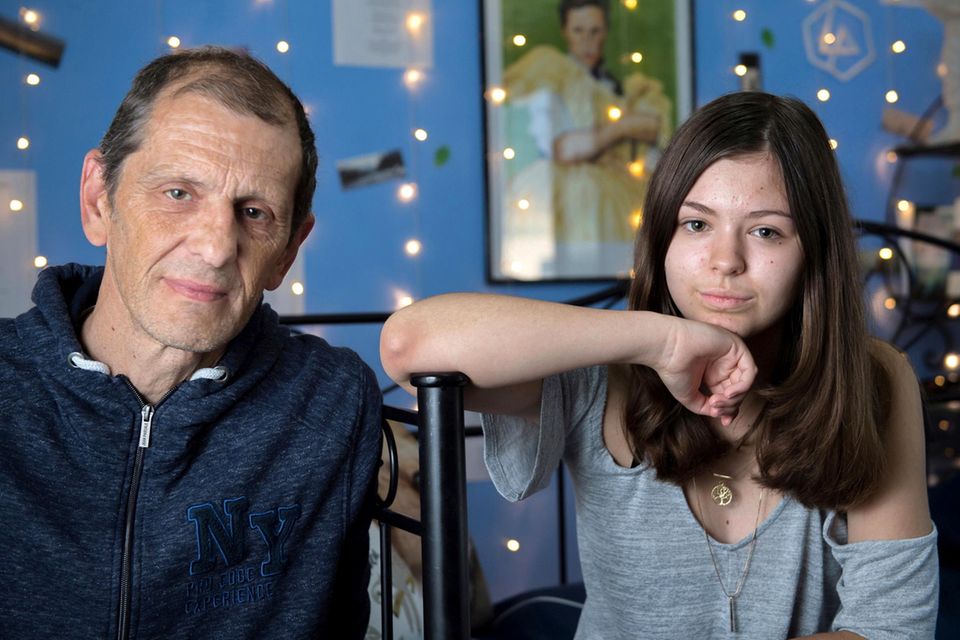Young Carers
Lana Rebhan has been caring for her father since she was 8 years old
Lana Rebhan has been looking after her father since she was eight years old. And asked myself: Am I the only child who feels this way?
© Lisa Leuchtmann
What she does: She looks after her seriously ill father. What she wants: more help for “young carers” like her. Who this affects: 480,000 children and young people.
Lana Rebhan spent her 13th birthday in the hospital. She woke up at the bedside of her father, who suffers from a chronic hereditary disease. He had just had a kidney removed and was being fed artificially through a tube. And Lana Rebhan sat next to her and ate her birthday cake with Benjamin flower decorations.
“It was an absurd situation,” she remembers today. And yet all of this, the tubes, the worries, the juxtaposition of serious illness and everyday life, was very normal for her even back then. Lana Rebhan has been caring for her father at home since she was eight years old in Königshofen, Lower Franconia. She makes sure he takes his medication, shops and cooks for him, while her mother earns a living for the family of three as a psychotherapy alternative practitioner.
“At the time I thought to myself that I can’t be the only child who feels this way,” says Rebhan, now 19. She started researching on the Internet and came across the term “Young Carers”, young carers – although almost only on English-language websites. Lana Rebhan decided to help such children in Germany too.
Young Carers: This is how Lana Rebhan wants to help them
Around 480,000 children and young people are currently caring for relatives in this country. In a phase of life that is actually reserved for afternoons at the sports club or in front of the games console, they are dealing with levels of care and the office hours of family doctors. “I couldn’t find any help for young carers like me anywhere and didn’t know anyone else who was affected,” says Rebhan. So after doing some internet research, she wrote a blog entry about her situation and had her mother show her how to program a website.
When she was 14, young-carers.de went online. Since then, she has been inviting other affected people to describe their experiences as young carers and answering emails and calls with questions from children and young people. She also makes information material available for download and points out offers of help that she has gradually found or initiated herself.
Lana Rebhan’s commitment has already taken her to the Bavarian state parliament, where she and the Green Party introduced several legislative proposals to relieve the burden on young carers. Most of them were not implemented, but at least there has been a specialist day for caring children and young people every year since then. “Things like that encourage me,” she says.
Lana received little compassion at school
Nevertheless, there is still a lot to do. Caring children are only entitled to household help under certain conditions – and usually only until their twelfth birthday. Afterwards, like Rebhan, they have to take care of the household themselves, and do so in addition to school. There, too, many people encounter little sympathy. In class, Rebhan says, she jumped every time she heard a siren outside. She didn’t hide the fact that she was taking care of her sick father, but she didn’t feel seen at school for what she did at home. “When my performance dropped, most teachers blamed it on puberty,” she remembers. “They just didn’t know how to deal with me.”
Luckily, Lana Rebhan’s father is doing so well today that he can look after himself during the day.
© Anand Anders / dpa / Picture Alliance
She left high school in the ninth grade and later obtained her qualifying secondary school diploma. Now she is demanding the support for others that was denied to her: “My wish would be that classmates, teachers and school psychologists would be just as aware of the situation of young carers as is the case with the issue of bullying. Young carers should be able to be temporarily exempted from lessons and homework without having to justify themselves .”
Lana Rebhan is now training to be a childcare worker an hour away from her hometown. Since her father is currently doing better and can look after himself during the day, she was able to move out of home. Nevertheless, she continues her commitment: her latest project is a mentoring program that brings young nurses together with volunteers or former sufferers. She hopes for more attention for young carers “who do heroic things,” as she believes. At the same time, she also wants to take away the heaviness that comes with the term. “I also get a lot of positive energy from helping my parents. When you look after someone, you give them love.”

